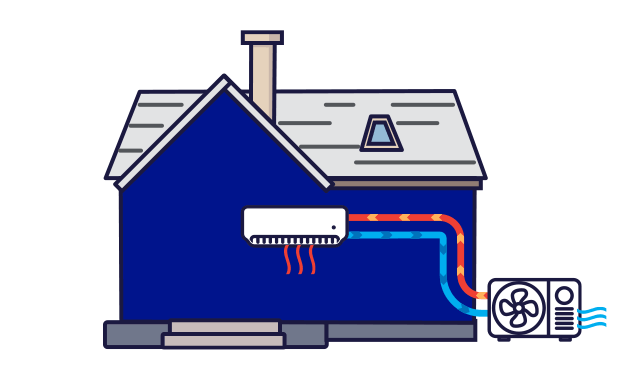Electric Heating & Cooling Heat Pumps

With rebates up to $15,000 and 7-year, 0% financing up to $25,000 it’s easier than ever to switch to a heat pump.
Save money and energy for years to come.
Experience the all-in-one comfort and energy savings of high-efficiency heat pump technology that keeps your home warm in the winter and cool in the summer without using fossil fuels. The new generation of heat pumps is part of our Clean Energy Vision and aligns with Massachusetts' climate action plans for more affordable, reliable energy that combats the increasing threats of climate change.
Put efficiency first.
If you plan to install a heat pump, weatherproofing your home is a smart first step. A tighter, more insulated home will not only save energy and reduce carbon emissions throughout the year, it may also allow you to buy smaller, lower-cost equipment. You may even be eligible for a $500 bonus when you weatherize first. Learn about Home Energy Assessments and how to get started.
If you’re considering installing a heat pump, check out additional information about rebates available through National Grid, a proud sponsor of Mass Save. Rebates may be even greater, depending on your income. You can also schedule a no-cost, virtual decarbonization consultation to discuss your goals and the unique needs of your home.
Why heat pumps?
Not only is Melanie an expert on heat pump systems, she’s an owner of one, too. In this video, Melanie breaks down how advances in technology put these systems at a competitive advantage versus traditional heating and cooling systems. And, heat pumps are one of the best ways to reduce your carbon footprint and reap the benefits of a cleaner energy future without sacrificing comfort.
How do heat pumps work?
During the colder months, heat pumps take heat from the outside air and transfer it into your home. During the warmer months, they keep your home cool by pulling warm air from inside your home and transferring it outside.

Instead of burning fossil fuels, heat pumps are powered by electricity to move—rather than create—heat to keep your home comfortable year-round. Today’s cold-climate heat pumps can be three to four times more efficient than furnaces, even at temperatures as low as -15 °F. You can use this Heating Comparison Calculator to see how a heat pump could impact your heating costs—and how much it could reduce your carbon emissions.
How do heat pumps compare to other systems?
Check out the advantages of choosing heat pump technology versus other heating and cooling equipment.
| Benefits | Heat Pumps | Other Heating and Cooling Equipment* |
|---|---|---|
| Both Heats and Cools | ||
| Year-Round Energy Savings | ||
| Saves Space | ||
| Reduce Maintenance | ||
| Eliminates Fossil Fuel Use and Storage | ||
| Reduces Carbon Emissions |
*Boiler, Furnace, Electric Resistance Heater, Central Air Conditioner, Window Air Conditioner
You may qualify for income-based incentives.

Based on your household income, you may be eligible for no-cost or discounted energy-efficiency products and services. You may qualify for up to 100% of the cost of approved home weatherization, and savings of up to 80% on heat pump installation, plus 0% financing on the rest of the cost.
This versatile and eco-friendly heating and cooling system is an excellent choice for new builds.
This technology can efficiently heat your home’s water, while using up to 70% less energy than traditional water heaters.
How old is your current equipment?
Check the age and health of your current heating and water-heating equipment—so you can plan ahead and avoid experiencing a breakdown.
Use this chart to see if you should upgrade you water heater, furnace or boiler to a high-efficiency heat pump.
| Type of Heat Pump Technology | Average Effective Unit Life Span (Years) |
|---|---|
| Air Source Heat Pump | 15 |
| Ground Source Heat Pump | 25 |
| Combination Boiler-Furnace | 20 |
| Furnace (Gas) | 22 |
| Steam Boiler (Steel Fire Tube) | 25 |
| Steam Boiler (Cast Iron or Steel Water Tube) | 30 |
| Hot Water Boiler | 35 |
